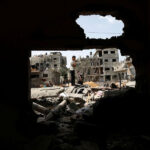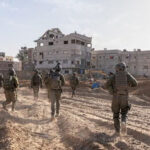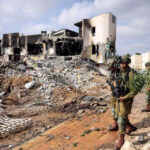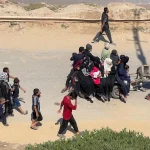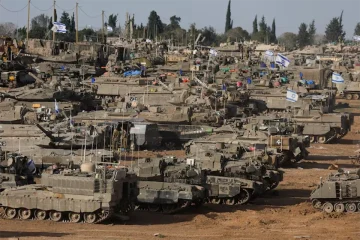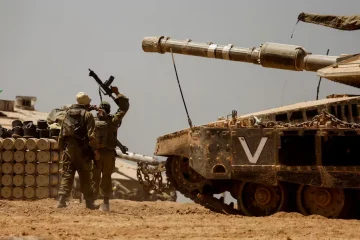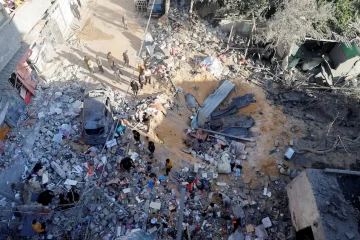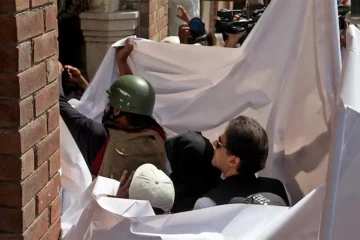FEARS that the Israel-Hamas war could mushroom into a wider Middle East conflict rose with Washington warning of a significant risk to U.S. interests in the region as ally Israel pounded Gaza and clashes on its border with Lebanon intensified.
Gaza’s Health Ministry said 266 Palestinians, including 117 children, had been killed by Israeli air strikes in the past 24 hours in the enclave, to which Israel laid “total siege” after a deadly mass infiltration into Israel by Hamas gunmen on Oct. 7.
In neighbouring Syria, where Hamas’ main regional backer Iran has a military presence, Israeli missiles hit Damascus and Aleppo international airports early on Sunday, putting both out of service and killing two workers, Syrian state media said.
Along Israel’s northern border with Lebanon, the Iran-backed Hezbollah group has clashed with Israeli forces in support of Hamas in the deadliest escalation of frontier violence since an Israel-Hezbollah war in 2006.
With violence around its heavily guarded borders increasing, Israel on Sunday added 14 communities close to Lebanon and Syria to its evacuation contingency plan in the north of the country.
Palestinian Prime Minister Mohammad Shtayyeh called on the international community to create “a united front” to stop Israel’s attacks against Gaza and allow in desperately needed aid which has only begun to trickle in.
“We place at the top of our priorities stopping the Israeli aggression (…) and bringing in medical and relief aid to prevent a major humanitarian catastrophe,” Shtayyeh said during a meeting with 25 ambassadors, representatives and consuls.
U.S. Defense Secretary Lloyd Austin said on Saturday that Washington would send more military assets to the Middle East in support of Israel and strengthen the U.S. defence posture in the region after “recent escalations by Iran and its proxy forces” – a reference to Hezbollah, Palestinian and other militants.
Austin told ABC’s “This Week” program on Sunday: “We’re concerned about potential escalation. In fact, what we’re seeing … is the prospect of a significant escalation of attacks on our troops and our people throughout the region.
“If any group or any country is looking to widen this conflict and take advantage of this very unfortunate situation … our advice is: don’t,” he added.
Washington has deployed a significant amount of naval power to the Middle East, including two aircraft carriers, support ships and about 2,000 Marines, to help deter attacks by Iran-affiliated forces.
Austin said a Terminal High Altitude Area Defense (THAAD) system and extra Patriot air defence missile system battalions will be sent to the region and more troops put on standby.
Iranian security officials told Reuters Iran’s strategy was for Middle East proxies like Hezbollah to pursue limited strikes on Israeli and U.S. targets but to avoid a major escalation that would draw in Tehran, a high-wire act for the Islamic Republic.
ISRAELI BLITZ ON HAMAS-RULED GAZA
Israel unleashed an aerial blitz on Gaza to its southwest after Hamas militants breached the border on October 7 killed 1,400 people, mainly civilians, and took 212 hostages back to Gaza.
Gaza’s Health Ministry said on Sunday that Israel’s air and missile strikes in retaliation had killed at least 4,741 and wounded 15,898, with over a million of the densely populated enclave’s 2.3 million people displaced.
Israel has amassed tanks and troops near the fenced border around Gaza for a planned ground invasion aiming to annihilate Hamas, after several inconclusive wars dating to its seizure of power there in 2007, after Israel ended a 38-year occupation.
Hamas’s armed wing said it had fired more rockets at Tel Aviv on Sunday. There was no immediate word of damage or casualties.
With Israel keeping up daily bombings, Palestinians said they received renewed Israeli military warnings to move from Gaza’s north to the south to avoid the deadliest theatre of the war.
They said military leaflets dropped on the territory, just 45 km (28 miles) long, contained the added warning that they could be identified as sympathisers with a “terrorist organisation” if they stayed put.
Gaza’s Health Ministry said most of the dead from air strikes over the past 24 hours were in Gaza’s south. Israel says it is only targeting militants and that they often use residential buildings as cover.
The first humanitarian aid convoy allowed into Gaza since the war erupted arrived in southern Gaza from Egypt on Saturday after days of negotiations. The U.N. said the 20-truck convoy brought life-saving medical supplies and some food.
A second convoy of around 19 trucks loaded with medical and food supplies entered the Egyptian side of the Rafah crossing on Sunday and was being inspected before proceeding into Gaza, sources said.
An explosion and ambulance sirens were heard on Sunday afternoon, shortly after the second convoy had entered the crossing, witnesses said. The cause and exact location were not immediately clear.
The U.N. humanitarian office said the volume of aid entering so far was just 4% of the daily average before the hostilities and a fraction of what was needed with food, water, medicines and fuel stocks running out.
Deprived of electricity and water, Gazans in the southern town of Khan Younis said they were struggling to feed their children.
“We are suffering extremely, waiting since dawn to get bread. If this continues for two more days it will be catastrophic,” said Saleh Skafi, a father of four from north Gaza now sheltering in Khan Younis.


